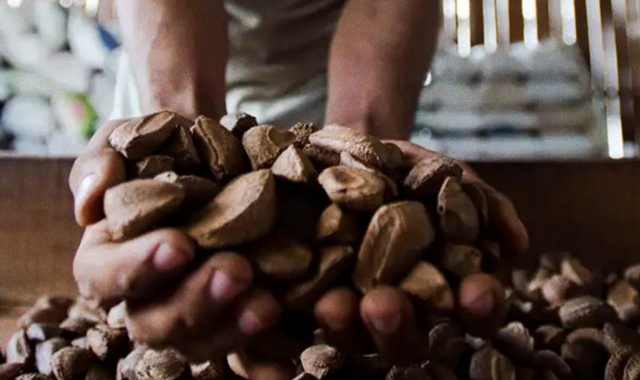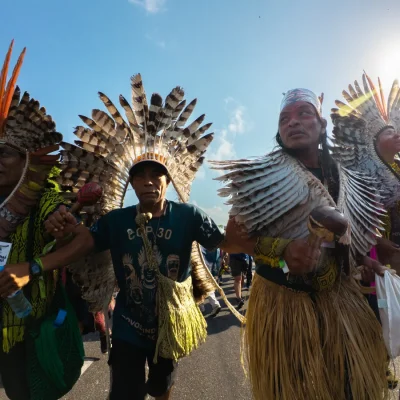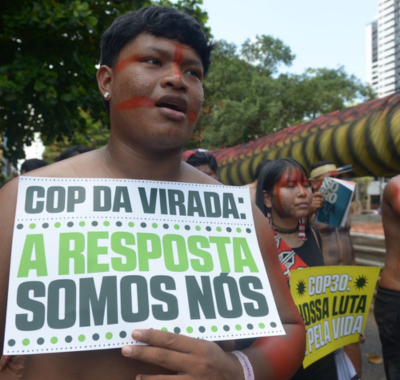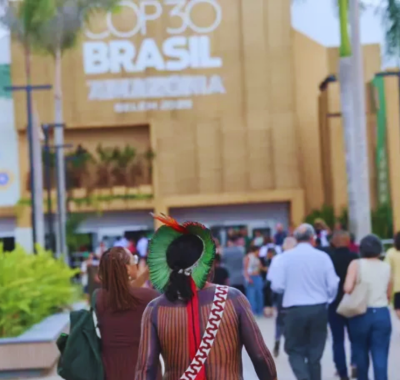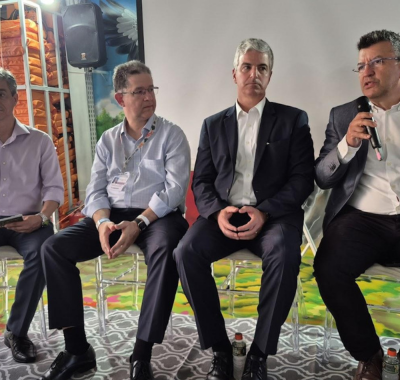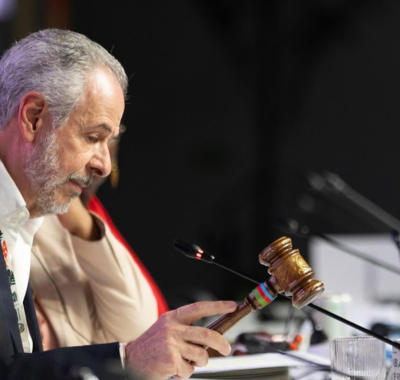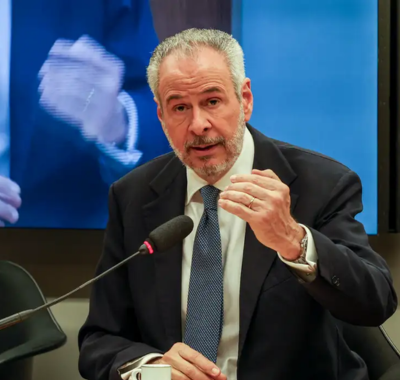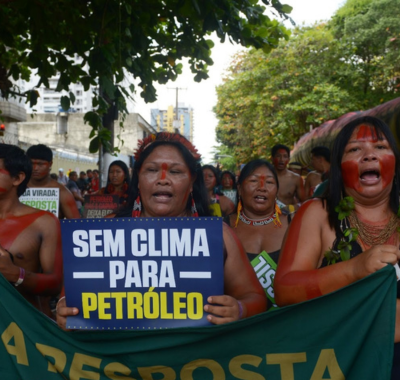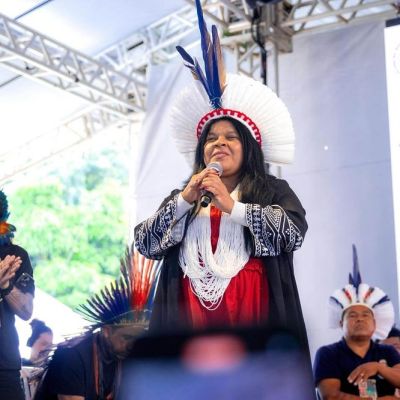Social movements serve up agroecology and resistance, showing that feeding the planet also means promoting climate justice
Author: Tatiana Ferreira Reis
The People’s Summit is the largest parallel event to COP30. It is promoted by social movements and traditional territories in Belém, Pará, during the climate conference. Until November 16th, the summit organizers will provide agroecological food for about 10,000 participants interested in exchanging experiences and listening to the proposals of indigenous peoples, quilombola communities, agro-extractive communities, riverside dwellers, and socio-environmental activists from around the world, gathered at the campus of the Federal University of Pará (UFPA), on the banks of the Guamá River.
Experienced organizations are in charge of food supply. They have worked to fight hunger during the Covid-19 pandemic, the floods in Rio Grande do Sul in 2024, and other situations where experiences such as community kitchens had to be set in motion. The organizations involved include the Landless Rural Workers’ Movement (MST), the Homeless Workers’ Movement (MTST), and the Popular Peasant Movement (MCP), in partnership with the UFPA students’ canteen. The menu is being prepared with ingredients produced by several communities in the Amazon and Brazil.
Ayala Ferreira, a national MST leader, explains that guaranteeing quality food sourced from the territories to all participants of the People’s Summit is a basic condition for the success of the mobilization. “Throughout the process of organizing the summit, it became clear that the climate justice agenda must include food because it connects important issues and solutions from the territories,” she explains. “In addition, nobody goes to rallies, struggles or debates on an empty stomach. At this summit, food has a political project embedded in it. That’s the core message we want to stress,” she adds.
The program addresses issues such as food and climate justice, food security and sovereignty, and the fight against pesticides. The activities include a large People’s Market featuring cuisine, agroecological food items, and handicrafts. On November 16th, the Summit will conclude with a large “banquet-rally” at República Square in the center of Belém, to integrate the city to the project of sharing and dialogue between people and territories.
For the MST, agroecology has taken on a central dimension in the debate on solutions to hunger and the promotion of climate justice. “If we promote integrated systems for production and distribution of agroecological foods by bringing the countryside and the city closer, considering the relationship between people and nature as a core element rather than profit, we build other social forms of sociability,” Ayala concludes.
During the Leaders’ Summit, a preparatory event preceding COP30, a controversy over the prices charged for food in the official negotiation area overshadowed an important fact: the launch of the Belém Declaration on Hunger, Poverty and Human-Centered Climate Action, endorsed by 43 countries and the European Union. For the first time, the document acknowledges the fight against hunger and poverty as a structuring theme for international climate negotiations, stressing the urgency of adaptation measures, especially those centered on human beings – such as social protection and the adoption of crop insurance.
The declaration points out that “Climate change, environmental degradation and biodiversity loss are already exacerbating hunger, poverty, food insecurity, jeopardizing access to water, worsening health and increasing mortality, exacerbating inequalities, and threatening livelihoods, with disproportionate impacts
on those already poor and in vulnerable situations.”
Risks to food security and sovereignty
In the Amazon, a region heavily affected by climate change, the consequences are intense. Severe heat, wildfires, prolonged droughts, rivers and streams drying up, in contrast to disrupted tides and “out-of-season” storms, as the Amazonian people refer to phenomena that disrupt climate forecasting based on traditional knowledge.
Among the worst effects felt in the region are the risks to food security and sovereignty. The average food security rate among the Brazilian population, according to the 2025 Continuous National Household Sample Survey (PNAD) conducted by the Brazilian Institute of Geography and Statistics (IBGE), indicates that 75.8% of households have full and regular access to adequate food. In the state of Pará, just over half of households (55.4%) face food security, while food insecurity affects 44.6% – the worst rate among Brazilian states.
Not even the production of açaí, one of the greatest symbols of Amazonian food culture, is immune to the damage caused by climate change. Pará is Brazil’s largest producer of açaí, accounting for 90% according to research published by the Amazon Foundation for Support of Studies and Research (FAPESPA), released in 2024. The municipality of Igarapé-Miri in the Lower Tocantins area ranks first in the state. Even so, agro-extractive communities in the municipality fear that their main source of income, which is also essential for the families’ food security, might be compromised.
Benedita Gonçalves, a leader in the Santo Antônio do Trevo do Carapajó territory in Igarapé-Miri, says that 2024 was one of the most challenging years. “We felt severe impacts. The açaí fruits wouldn’t ripen; they’d just dry up. We even saw entire açaí palm tree crowns falling down,” she reports. “Even where there hadn’t been any fire, it was as if everything had been burned. Nobody was able to plant crops. That’s why we didn’t even have cassava,” she adds.
Her account coincides with the climate information recorded for 2024. According to an InfoAmazonia investigation based on data from the National Center for Monitoring and Early Warnings of Natural Disasters (CEMADEN), an agency linked to Brazil’s Ministry of Science, Technology and Innovation (MCTI), over half of the municipalities in the region faced drought for almost the entire year. The agency is responsible for issuing natural disaster early warnings for the whole country.
Educator Vânia Carvalho has also been witnessing the impacts of climate change on food systems. She works with the Dema Fund, a civil society organization focused on climate and socio-environmental justice that has supported more than 4,000 quilombola, agro-extractive, riverine, and indigenous communities until 2025. “That’s a general concern in the territories we monitor because the Amazon has diverse food cultures that are highly valued by the population. So, every year we witness more problems caused by climate change.”
Agro-extractive, fishing, and handicraft worker Dayane Araújo from the Pirocaba agro-extractive territory in Abaetetuba, in the Lower Tocantins area, says that, in addition to açaí, many species of biodiversity are at risk. “Shrimp and highwaterman catfish were very common in the territory. In recent years, we have been fishing with great difficulty. Andiroba, peach palm, cupuassu, and bacaba are also more difficult to collect.” The Pirocaba territory is among those that develop projects with support from the Dema Fund.
Vânia Araújo observes that the impacts caused by the effects of global warming in the territories are added to the problems created by the advance of large-scale enterprises and monocultures, such as soybeans, increasing the risks to communities’ food sovereignty and security. “The advance of corporations into traditional territories also causes forced displacement and community disruption, in addition to pesticide contamination of land and water,” she adds. She recalls that an important, although less recognized, problem is the food industry’s interference in Amazonian food cultures, compromising traditional practices.
Women guardians of traditional knowledge
The interference of the food industry in people’s eating habits is also a matter of concern for Auda Piani, an activist, cultural producer, and researcher on Amazonian food knowledge. Piani lives in Icoaraci, a district of Belém, located 20 kilometers from the city center, known for its ceramic production hub, its fish-centered cuisine and the diversity of cultural expressions. In 2013, she started project “Among Pots, Memories and Senses,” which publishes books, produces documentaries and promotes educational experiences focused on food cultures.
Based on what she has witnessed in traditional territories, Piani believes that solutions to the climate crisis will only be found if we combat corporations’ pressure over Amazonian territories, which destroys productive areas and changes eating habits. Born in Marajó, she has heard complaints about the impacts of climate change and large-scale projects on the mangroves, floodplains, and waters that surround the archipelago, resulting in a decrease in fish diversity and availability.
Piani arrived in Belém in the 1960s, when the city was full of backyards producing food and medicinal plants and provided relief from the heat. “In the heart of the Amazon, Belém is now a city full of buildings. Children are unaware of the origin of what they are eating because of the distance from nature, just as a large part of the population has lost contact with the land, with the production of fruit trees such as peach palm, cupuassu, and bacuri, as well as vegetable gardens,” she says, referring to the urban growth and real estate speculation that occurred in the city, mainly from the 1980s onwards.
She believes that the presence of ultra-processed foods throughout the state is a serious problem for the region as it contributes to disrupting traditional food systems. “Unfortunately, we find sausages and ultra-processed foods even in the most remote territories, threatening food cultures and Amazonian identities, which are closely linked to how we socialize and how we relate to nature,” she explains.
They make lots of fish porridge with little flour
Faced with the need to address the issue and also due to lack of representation at official COP30 events, Auda Piani and a group of cultural producers from Icoaraci joined forces to launch “Pé Redondo Circuit – Icoaraci makes COP30 move”. The program, held throughout November, includes music, theater, and literature activities, handicraft sales, a photo and art show, as well as a culinary exhibition of project “They make lots of fish porridge with little flour,” in which they serve dishes such as pumpkin vatapá, shrimp with green coconut, and maniçoba (a traditional dish in Pará cuisine), in a version prepared with smoked pork, without processed meats.
The project, awarded under the Aldir Blanc National Policy in the area of food culture, is inspired by the practices of many Amazonian women cooks who use traditional knowledge to creatively “increase the food with limited ingredients” in order to fight hunger in times of scarcity. “We brought together women from different territories to record and share knowledge and encourage healthy eating, making the most of the ingredients available in the territories. We cook together and develop recipes and products that can generate income and food security. It’s a way to combat the loss of traditional knowledge caused by the food industry,” Piani explains.
Research on food systems
The importance of women as guardians of food sovereignty and security in traditional territories is also the focus of the work of Venezuelan researcher Ana Felicien. She dedicated her doctoral studies at the Amazonian Institute of Family Agriculture (INEAF) at the Federal University of Pará (UFPA) to investigating food systems at the Camiranga quilombo (slave-descendant community) in northeastern Pará and at the Afro-Venezuelan community of Cuyagua, in the Henri Pittier National Park, Venezuela’s oldest conservation unit.
The research’s goal was to understand how food practices in these territories are affected by the increasing advance of the corporate food regime, a concept that is central to her work and can be translated as corporate dominance over the entire food cycle, from production to sales to consumption. In this process, food becomes a commodity while traditional knowledge and practices are marginalized. In the territories covered by the study, Felicien found that younger age groups consume more processed foods, which threatens health and the intergenerational transmission of traditional knowledge.
The study also looked into production, distribution, and consumption practices for the main crops in the two communities. While the quilombola territory in Pará produces mostly açaí and cassava, plantains and cacao are most important items in the Afro-Venezuelan community. Even when these food items are integrated into the market, the reciprocal relationships involved in their production and consumption are important for the communities’ food sovereignty.
Ana Felicien warns that “the food practices of those traditional territories are heavily influenced by this mode of production that prioritizes monoculture, land concentration, land grabbing, and the intensive use of pesticides.” These threats, both historical and current, are exacerbated by the losses and damages caused by climate change, which affect agro-extractive production. In both territories, she explains, public policies aimed at food security have been implemented, “but their effectiveness is limited as there is no actual support for family farming and agro-extractive activities, much less policies for adaptation and loss and damage focused on traditional communities.”
Among the research findings, Felicien stresses the importance of women’s work, especially cooks and school lunch ladies, in establishing food sovereignty as an everyday policy. “They activate traditional knowledge and collective actions to improve the quality of food. Thus, they organize solidarity-based supply chains through reciprocal relationships involving exchanges, donations, and practices that guarantee the implementation of public policies, such as school meals, in addition to enabling traditional festivals and local economies,” she concludes.
—
This report was produced by O Joio e O Trigo, through the Collaborative Socio-environmental Coverage of COP 30. Read the original report at: https://ojoioeotrigo.com.br/2025/11/na-cupula-dos-povos-o-prato-e-politico/

